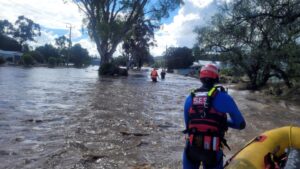Tuvalu has said it plans to build a digital version of itself, replicating islands and landmarks and preserving its history and culture, as rising sea levels threaten to submerge the tiny Pacific island nation.
Tuvalu’s Foreign Minister Simon Kofe told the COP27 climate
summit on Tuesday that it was time to look at alternative solutions for his
country’s survival and this included Tuvalu becoming the first
digitised nation in the metaverse – an online realm that uses
augmented and virtual reality (VR) to help users interact.
“Our land, our ocean, our culture are the most precious
assets of our people and to keep them safe from harm, no matter
what happens in the physical world, we will move them to the
cloud,” he said in the video that sees him standing on a digital
replica of an islet threatened by rising sea levels.
READ MORE:
UN climate talks near halftime with key issues unresolved
Kofe grabbed global attention at last year’s COP26 when he
addressed the conference standing knee-deep in the sea to
illustrate how Tuvalu is on the front line of climate crisis.
Tuvalu was having to act because countries globally were not
doing enough to prevent climate change, he said.
Tuvalu will be the first country to replicate itself in the
metaverse but follows both the city of Seoul and the island
nation of Barbados which last year said they would enter the
metaverse to provide administrative and consular services,
respectively.
“The idea is to continue to function as a state and beyond
that to preserve our culture, our knowledge, our history in a
digital space,” Kofe said ahead of the announcement.
Under water by the end of the century
Tuvalu, a group of nine islands and 12,000 people halfway
between Australia and Hawaii, has long been a cause celebre for
the risks of climate change and rising sea levels.
Up to 40 percent of the capital district is underwater at high
tide and the entire country is forecast to be under water by
the end of the century.
Kofe said he hoped the creation of a digital nation would
allow Tuvalu to continue to function as a state even if it
becomes completely submerged.
READ MORE:
The metaverse will not take off until it fixes these four problems
This is important as the government begins efforts to ensure
that Tuvalu continues to be recognised internationally as a
state and its maritime boundaries – and the resources within
those waters – are maintained even if the islands are submerged.
Kofe said seven governments have agreed to continual recognition but there were challenges if Tuvalu goes under as it is a new area of international law.




















































Be First to Comment